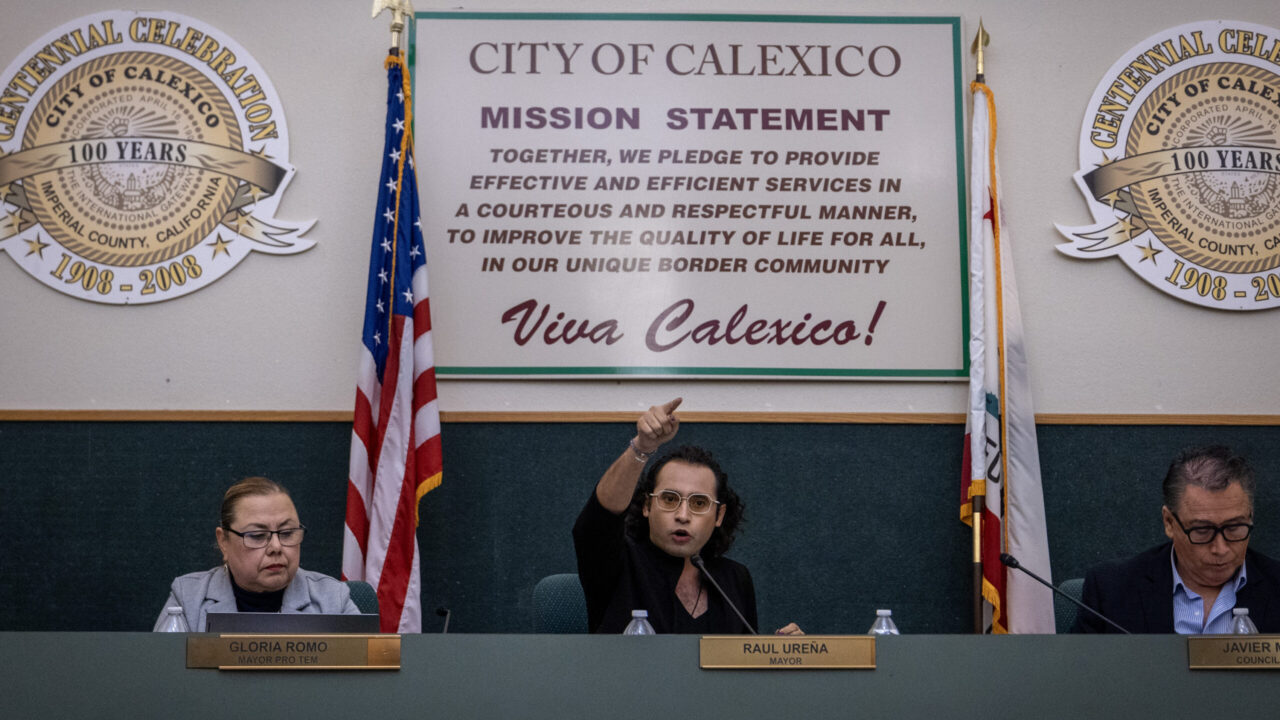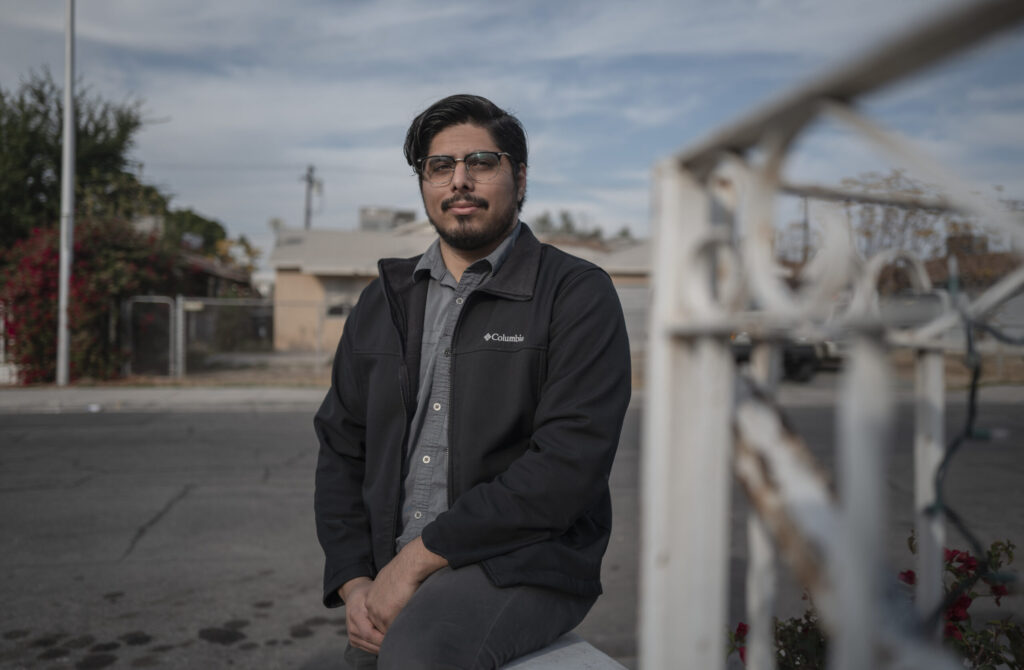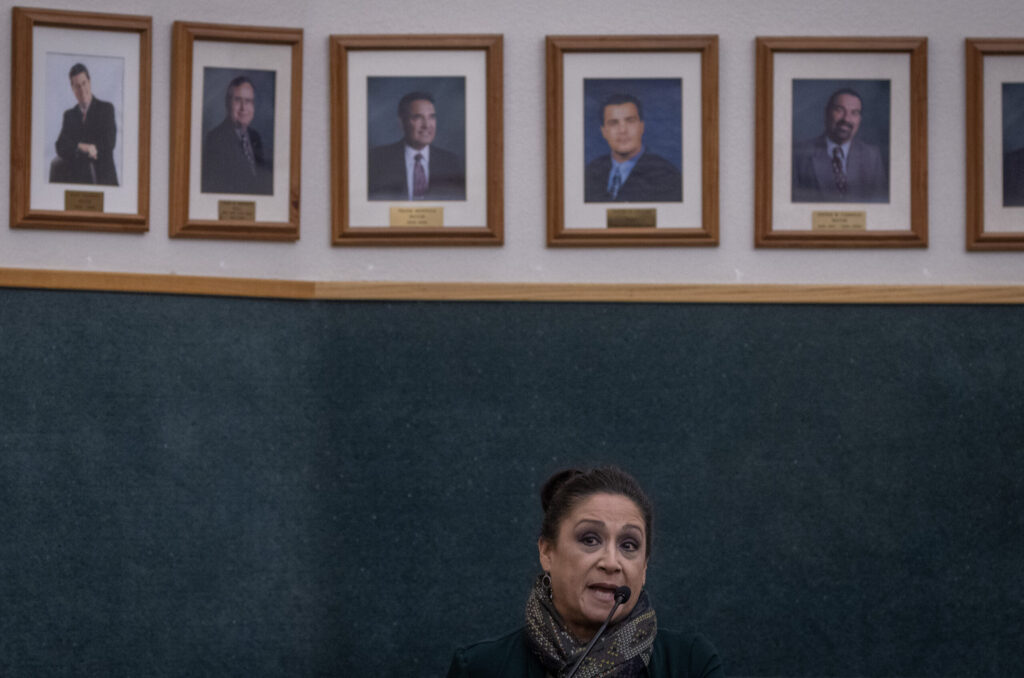California’s Latest Recall Target Is Calexico’s First Transgender Mayor
Campaign leaders claim gender identity is not a factor. They say they want two newer councilmembers out for reasons including being anti-business, soft on crime and holding meetings in Spanish. Calexico Mayor Raul Ureña speaks during a city council meeting in December. Photo: Barbara Davidson / Capital & Main
Calexico Mayor Raul Ureña speaks during a city council meeting in December. Photo: Barbara Davidson / Capital & Main
As Calexico Mayor Raul Ureña walked through the city’s six-block business district on a shirtsleeve winter’s morning, a 10-minute jaunt turned into 20, then 30, then an hour.
Ureña, a councilmember who served as mayor of this working-class city (population: 38,600) at the southeastern edge of California from March to January, could barely move a few yards without getting stopped. Salesclerks at mom-and-pop department stores, random passersby, taxi drivers — all wanted to chat.
A cabbie in an orange-and-black electric SUV waved Ureña over at a stop sign to applaud Calexico’s “public Uber,” a subsidized, on-demand microtransit program Ureña pushed for as Calexico’s representative on the Imperial County Transportation Commission. The program, which launched last year and offers door-to-door ride shares for $2 ($1 for seniors and the disabled), is a hit in a city a bridge away from Mexicali, Baja California. where some 15,000 pedestrians (mostly commuting farmworkers) walk to Calexico every day.
On this charmed morning, no one stared or snarked or said the word “recall,” the ax-wielding monkey on Ureña’s back — and the big political story in Calexico, if not this entire swath of the Imperial Valley. “Downtown is the heart of my opposition,” Ureña said, chuckling as if in enemy territory.
Not two years ago, Calixecans hailed candidates Ureña and Manzanarez as changemakers, refreshing new blood on a city council tainted by corruption and scandal.
Ureña, at 26, the youngest, most progressive and first openly transgender elected official of Calexico, and Gilberto Manzanarez, 30, a political ally on the city council, have become the latest elected politicians in California forced into do-overs. Recall petitions, launched by former political leaders in Calexico, met the required signatures on Nov. 30. A special election, expected to cost more than $125,000, is set for April 16. Ureña’s stint as mayor, a largely ceremonial job rotated among the five city council members, ended Jan. 17th. The recall is after Ureña’s council seat, with three years left to go.
Calexico’s recall battle is an intense local power struggle — young progressives versus establishment politicians, social justice warriors versus business owners, upstarts versus the old guard — a generational, foundational divide that raises questions about how a dysfunctional city with limited resources can best serve its residents.
The power struggle is also yet another example of politics in the age of recalls. Winning an election, even in a landslide, means little to political foes who refuse to wait four years for another shot. (Cue Gavin Newsom, who won the governor’s race with more than 60% of the vote in 2018, and his recall by the same margin two years later). Ballotpedia, which analyzes recall efforts across the country, has found that most are waged at the local level: City (or town) council officeholders drew more recall petitions than any other officeholders for the last five years, except for a blip in 2021, when the pandemic-era school board wars took the lead.
Not two years ago, Calixecans hailed candidates Ureña and Manzanarez as changemakers, refreshing new blood on a city council tainted by corruption and scandal. Each had returned to Calexico from college during the pandemic disheartened at the homelessness, poverty and the lack of plans to fix them. After joining — and forming — social justice groups, each decided the Calexico City Council needed to change.

In 2020, at age 23, Ureña won a council seat in a landslide. But that two-year stint, filling a vacancy left by a councilmember convicted of federal bribery charges, left little time — and few allies — to accomplish goals. It wasn’t until November 2022, when Manzanarez was elected, and Ureña won a full, four-year term (garnering the most votes of seven candidates vying for two seats) that Calexico woke up to new politics. The two, who campaigned as a team, helped flip the city council to a progressive majority, 3-2, for the first time.
Their official goal — to fix city hall, which a state audit had blasted for disastrous financial mismanagement for more than a decade.
But Ureña and Manzanarez were presented with a recall notice during a city council meeting four months after their (2023-2027) terms began. Ureña had become mayor (a one-year post voted on by the council, whose members rotate in the position) and, presiding over the meeting, ripped up the recall notice Nancy Pelosi style in front of the audience.
Manzanarez didn’t take the petition seriously, either. “The whole thing is ridiculous,” he said in a recent interview. “At least give me the chance to mess up first.”
The recall petition accuses Ureña and Manzanarez of ignoring the needs of downtown business owners, disrespecting police and having misplaced priorities, the results of which have been increased crime and threats to public safety.
Politics is a gladiator sport in Calexico. The current recall efforts are the third in three years.
Maritza Hurtado, a former mayor and councilmember (2010-2018) launched the recall effort as a businesswoman who has owned a family-run tax and immigrant services office downtown for 35 years. She said Ureña and Manzanarez are pushing a homeless shelter project downtown, support a needle-exchange program, have asked police to leave transients alone, and want to get rid of the business improvement district — in short, a laundry list of progressive programs business interests hate.
Not to mention, Hurtado said, the two have been arrogant about it. “They weren’t even communicating with us,” she said.
Ureña and Hurtado have also clashed over how to communicate in Calexico — in English or Spanish or both? Calexico is 97.8% Mexican-American or Mexican, and Spanish is the language spoken on the streets.
Still, Hurtado says, Ureña is violating California law by conducting meetings in Spanish and pushing to make all official events bilingual simultaneously.
Ureña counters that the legal code was written decades ago to codify racism, and it needs to change. (Acting California State Auditor Michael Tilden, in the latest state audit, concurred, calling the city’s English-only budget “a format that limits the engagement of its residents, the vast majority of whom speak Spanish.”)
Hurtado said Ureña called her a racist.
Ureña’s response? “Yes, I have called Hurtado a racist many times.”
In fact, the name-calling is on the recall petition.
Politics is a gladiator sport in Calexico. The current recall efforts are the third in three years. In 2022, a recall petition failed against the then-mayor, Javier Moreno. In 2021 Manzanarez, with Ureña’s support, started launching a recall against a councilmember, Rosie Fernandez. (She lost her seat and is part of the current recall committee).
What role Ureña’s gender identity has played in the success of the recall petitions — and will play in the recall election — is an open question. Ureña came out as “gender fluid/trans” in 2022, not entirely voluntarily. In 2020, opponents found images of Ureña in drag from private social media accounts. Ureña, an economics major at U.C. Santa Cruz, at the time (now a master’s candidate in statistics at San Diego State University), said political opponents have circulated the images for three years.

In March, during his swearing in as mayor, Ureña wore a dress.
Reaction was mixed, at best.
Ureña says by then, coming out seemed, if not safe, then honest. (Ureña does not have a preferred pronoun — says “she, he, they” when asked — but family, friends and the public use “he” most often.)
Ureña was a popular public citizen in Calexico. He entered politics at age 12, when the family moved back to the city from Salinas and young Raul started attending school board meetings “to find out why the schools lagged behind Salinas schools.” Then he started running candidates. During college, Ureña commuted back and forth every two weeks from Santa Cruz, more than eight hours each way, to work on local campaigns.
At his swearing in as mayor, Ureña recalled a groundswell of support. “I felt well received by the community, with a lot of faith,” Ureña said.
Then the recall campaign began, complete with what Ureña called “slanderous lies.”
Hurtado says Ureña’s gender identity has nothing to do with her recall petition.The group’s (private) Facebook page requests that participants not engage in discussions of the subject, and Hurtado’s problems with Ureña precede his coming out.
But recall supporters have no control over anonymous Instagram posts made by unwitting bedfellows — LGBTQ haters. Ureña’s official Instagram account is trolled relentlessly. In June, when the city became the first in Imperial County to raise a pride flag, a woman attacked Ureña in front of the crowd.
Ureña, who keeps a full schedule of public appearances, sometimes in dresses, sometimes jeans, has no plans to avoid the trolls as he returns to the council.
“I was just ignoring all the slander and the hate,” he said. “But no more.”
Copyright 2024 Capital & Main.
Note: After speaking with Capital & Main at length and on the record, former Calexico Mayor Maritza Hurtado said she believed the publication was showing bias in favor of Mayor Raul Ureña while taking photographs for this story and asked to retract her quotes. Capital & Main denies that assertion.
Your support matters…Independent journalism is under threat and overshadowed by heavily funded mainstream media.
You can help level the playing field. Become a member.
Your tax-deductible contribution keeps us digging beneath the headlines to give you thought-provoking, investigative reporting and analysis that unearths what's really happening- without compromise.
Give today to support our courageous, independent journalists.
You need to be a supporter to comment.
There are currently no responses to this article.
Be the first to respond.